Singapore Roofing FAQ 2025: Costs, Materials, Repairs & Choosing the Right Contractor
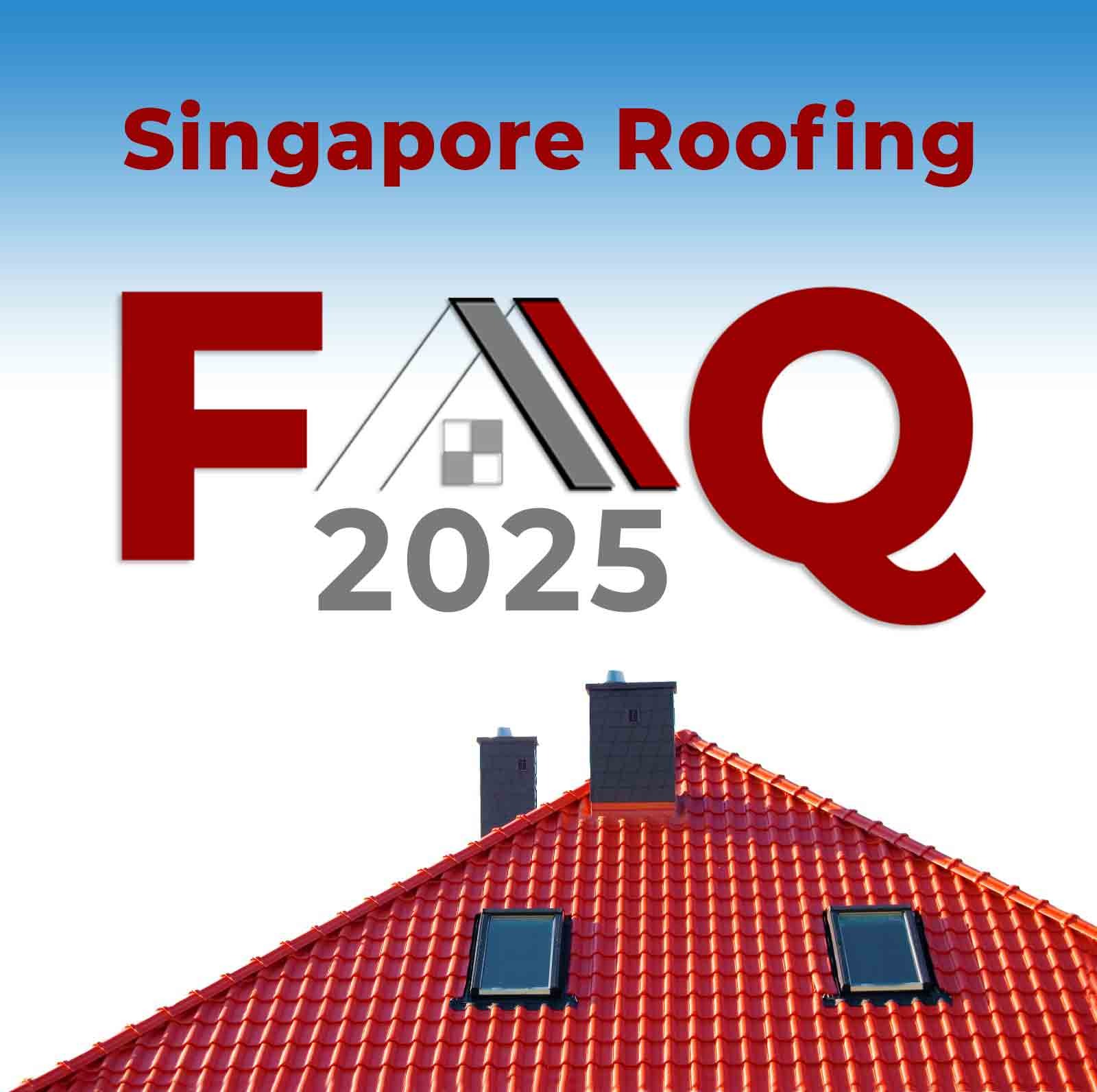
1. Choosing the Best Roofing Contractor
How do I find the best roofing contractor?
To find the best roofing contractor in Singapore, always start by search on google with “Roofing Contractor” or “Rooftop Contractor”, you will see the top contractors on the first page. After that check if they are BCA-licensed and insured. This ensures they meet national standards and you’re protected if anything goes wrong. Look for companies with at least 5–10 years of local experience, as Singapore’s tropical climate requires special expertise in handling heavy rain, humidity, and intense sun.
- Tip: Read recent Google reviews, ask for local references, and request a detailed written quote. A reputable firm, like SP Roofing Contractor, will also offer clear warranties and after-service support.
- Local Insight: With Singapore’s construction sector expected to grow by 4.1% in 2025, competition is strong-don’t settle for the first quote you get.
Which company is the best for roofing?
SP Roofing Contractor stands out for its blend of experience, quality workmanship, and transparent pricing. We’ve served residential, commercial, and industrial clients since 2007, adapting to Singapore’s unique weather and building codes.
- Extra: While we strive to be your preferred roofing partner, we also recommend getting quotes from other reputable companies like JK Roof Contractor, The Roof Specialist, and High Tech Roof & Waterproofing. All of us have been serving Singapore for over a decade, and each is dedicated to high standards. Ultimately, the best choice comes down to your needs and comfort-our main goal is to ensure every property owner gets the best possible roofing service and support.
How do I choose a good roofing company?
Look for these must haves:
-
-
- BCA license and insurance
- Solid track record with local projects
- Clear, itemized quotes
- Written contracts covering scope, timeline, and warranty
-
- Pro Tip: Visit one of their past project sites or call a reference before signing. You can also ask question on the contractors Google Business Profile (Map Profile) “QnA” section.
What is the best contract for contractors?
A good contract should list the full scope of work, materials (with brands/specs), timeline, payment schedule, and warranty terms.
- Tip: Never pay the full amount upfront. Stagger payments based on milestones, and ensure the warranty covers both materials and workmanship.

2. Roofing Costs in Singapore
How much does it cost to replace a roof in Singapore?
Roof replacement in Singapore typically ranges from S$5,000 to S$40,000. For a standard 1,000 sq ft roof, expect S$5,000–S$18,000, while larger or complex roofs (2,500 sq ft or more) can go up to S$40,000.
Why the range? Costs depend on material, roof pitch, height, and accessibility. Labour is a major factor, making up 60–70% of the total bill.
- Local Insight: With ongoing infrastructure growth and higher material costs post-pandemic, prices have risen 10–15% since 2023. If you are taking a decision, we suggest you read our informative article first “Roof Replacement: When Does a Roof Need to Be Replaced?“. This guide will help you take a smooth decision.
How much does it cost to repair a leaking roof?
Minor leak repairs start from S$250 to S$1,500. If water damage has spread, costs can rise to S$3,000 or more.
- Tip: Fix leaks early-delaying can lead to mold, ceiling damage, and much higher bills. Read more for better understanding “How Early Roof Repair Saves Money in the Long Run“.
How much does it cost to repair a sagging roof?
Sagging roof repairs can range from S$3,000 to S$10,000, depending on the cause (e.g., rotting beams, water damage).
- Pro Tip: Always address the root cause, not just the symptoms, to avoid repeat repairs. You can get a free non-obligatiory estimation from us. Call us directly or Whatsapp us now!
What is the price for roof sealing (waterproofing)?
Roof waterproofing costs about S$3 to S$8 per sq ft. For a 1,000 sq ft roof, budget S$3,000–S$8,000.
- Insight: In Singapore’s rainy climate, waterproofing is not optional-it’s a must for property protection.
Are roof leaks expensive?
Small leaks are affordable to fix if caught early, but ignored leaks can lead to structural repairs costing S$10,000 or more.
- Stat: 40% of Singaporean homeowners reported us roof leaks as a top maintenance concern during the rainy season.
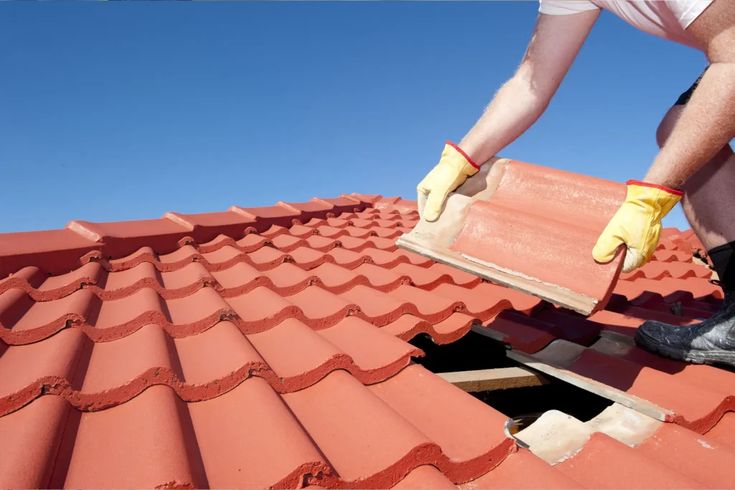
3. Roofing Materials: Costs, Lifespan & Trends
What are the 5 cheapest roofing materials in 2025?
-
- Bitumen roofing sheets (S$3–S$8/sq ft): Great for waterproofing, common in industrial settings.
- Asphalt shingles (S$5–S$10/sq ft): Budget-friendly, easy to install, 15–20 years lifespan.
- Corrugated metal sheets (S$6–S$12/sq ft): Durable, heat-reflective, lasts 30–50 years.
- Synthetic roofing tiles (S$8–S$14/sq ft): Lightweight, good durability, modern look.
- Concrete tiles (S$10–S$15/sq ft): Long-lasting (30–50 years), but heavier and needs strong support.
- Local Tip: Corrugated metal is gaining popularity for its resilience to Singapore’s heavy rain and sun.
Which roof is the cheapest?
Bitumen sheets and asphalt shingles are the most affordable options, but may need more frequent replacement in Singapore’s harsh climate.
Which roof is more expensive?
Clay tiles (S$15–S$25/sq ft) and copper metal roofs top the price range but can last 50+ years with proper care.
How long does the cheapest roof last?
Asphalt shingles and bitumen sheets last 10–20 years. Regular maintenance can stretch this, but Singapore’s humidity and storms mean you’ll likely need to replace them sooner than in drier climates.
Which roof tiles are expensive?
Clay tiles are premium, offering classic looks and longevity, but at a higher price.
How much does a metal roof cost?
Metal roofing costs S$10–S$20 per sq ft. While upfront costs are higher than shingles, metal roofs last up to 50 years and reflect heat, helping lower energy bills.
What are the top 5 roofing materials?
-
- Metal roofing
- Clay tiles
- Concrete tiles
- Asphalt shingles
- Bitumen sheets
- Trend: Energy-efficient and sustainable materials are gaining traction due to government green building initiatives.
Which type of roofing is best?
Metal roofing is ideal for Singapore’s climate: it’s durable, low-maintenance, and resists mold. Concrete tiles are also popular for their longevity, while asphalt shingles are best for tight budgets.
What is the newest type of roofing?
Solar-integrated roofing is emerging, letting you generate power while protecting your home a smart move with Singapore’s push for renewable energy by 2030. One of the top Singaporean companies who are making rooftop solar accessible for all property owners is ” Get Solar Pte. Ltd “. They believe in transforming every home and business into a clean energy hub. And solar roofing service happens to be the perfect domain they dominate in Singapore.
What type of roof lasts the longest?
Clay and concrete tiles, as well as metal roofing, can last 30–50 years or more with proper care.
How long do roof tiles last?
Concrete and clay tiles typically last 30–50 years, making them a smart long-term investment.
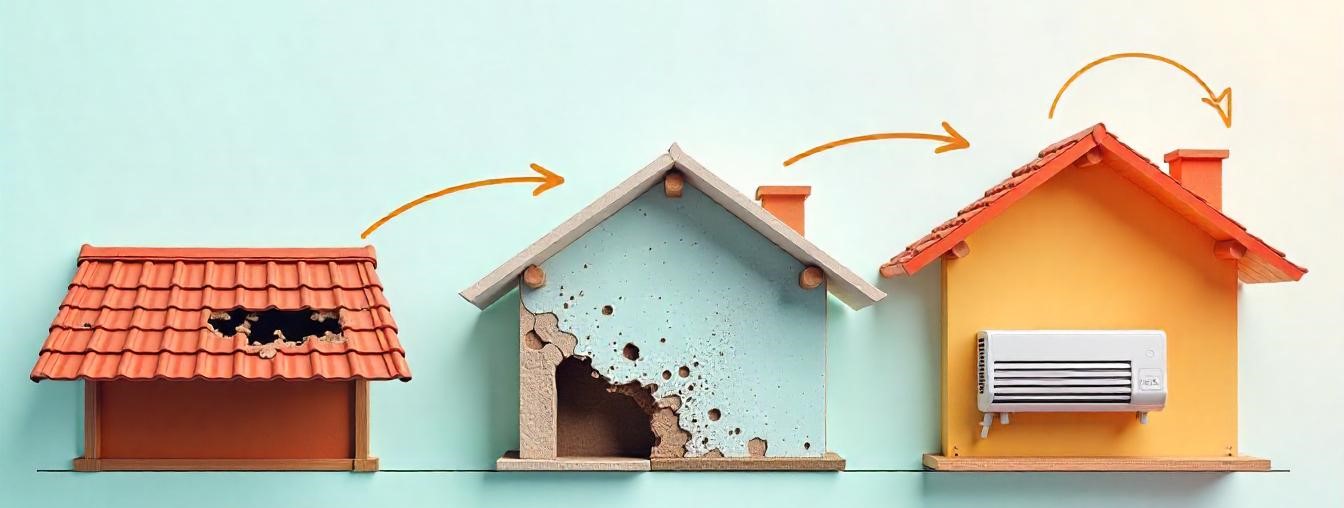
4. Roof Repair vs Replacement
Can you repair a roof without replacing it?
Yes, most leaks, broken tiles, or small cracks can be fixed without a full replacement. Only roofs with widespread damage or structural issues need total replacement.
- Tip: Schedule annual inspections-early fixes are much cheaper.
Is it worth it to repair a roof?
Absolutely. Repairing a small leak for S$250–S$500 can prevent thousands in water damage or mold remediation.
- Insight: In Singapore’s climate, proactive maintenance is always less expensive than emergency repairs.
Do I need a full or partial roof replacement?
If damage is limited to one area, partial replacement is fine. If your roof is leaking in multiple spots, sagging, or over 25 years old, a full replacement is safer and more cost-effective. For more knowledge, give a birds eye view on our informative article for better decision making- Roof Replacement: When Does a Roof Need to Be Replaced?
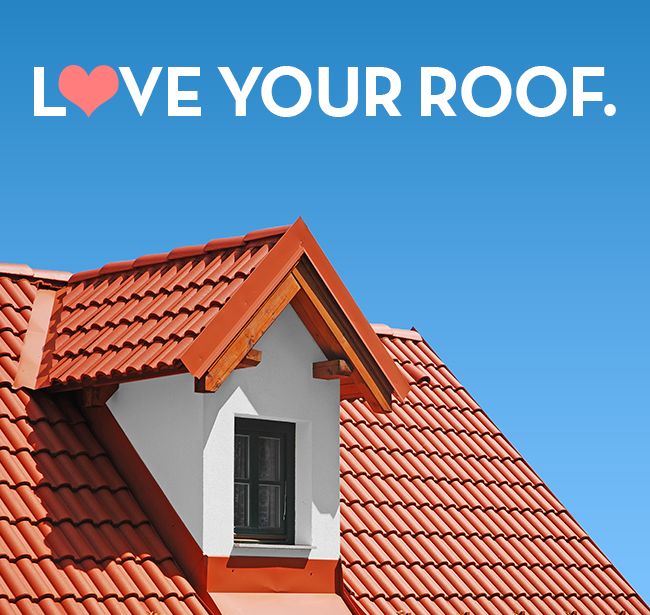
5. Roof Maintenance & Lifespan
How often should you repair a roof?
Inspect your roof at least once a year and after major storms. Address any issues immediately-Singapore’s weather can turn small problems into big ones fast.
How long does a roof last?
-
- Asphalt shingles: 15–20 years
- Metal roofing: 30–50 years
- Concrete/clay tiles: 30–50 years
- Tip: Lifespans depend on regular cleaning and prompt repairs, especially in humid climates.
When should I worry about my roof?
If you see leaks, sagging, missing tiles, or daylight in your attic, act fast. Singapore’s heavy rainfall can turn minor issues into major headaches overnight.
What does a bad roof look like?
Common signs include cracked/missing tiles, moss or algae growth, water stains on ceilings, and visible sagging.
- Pro Tip: Moss is more than cosmetic-it traps moisture and speeds up roof damage.
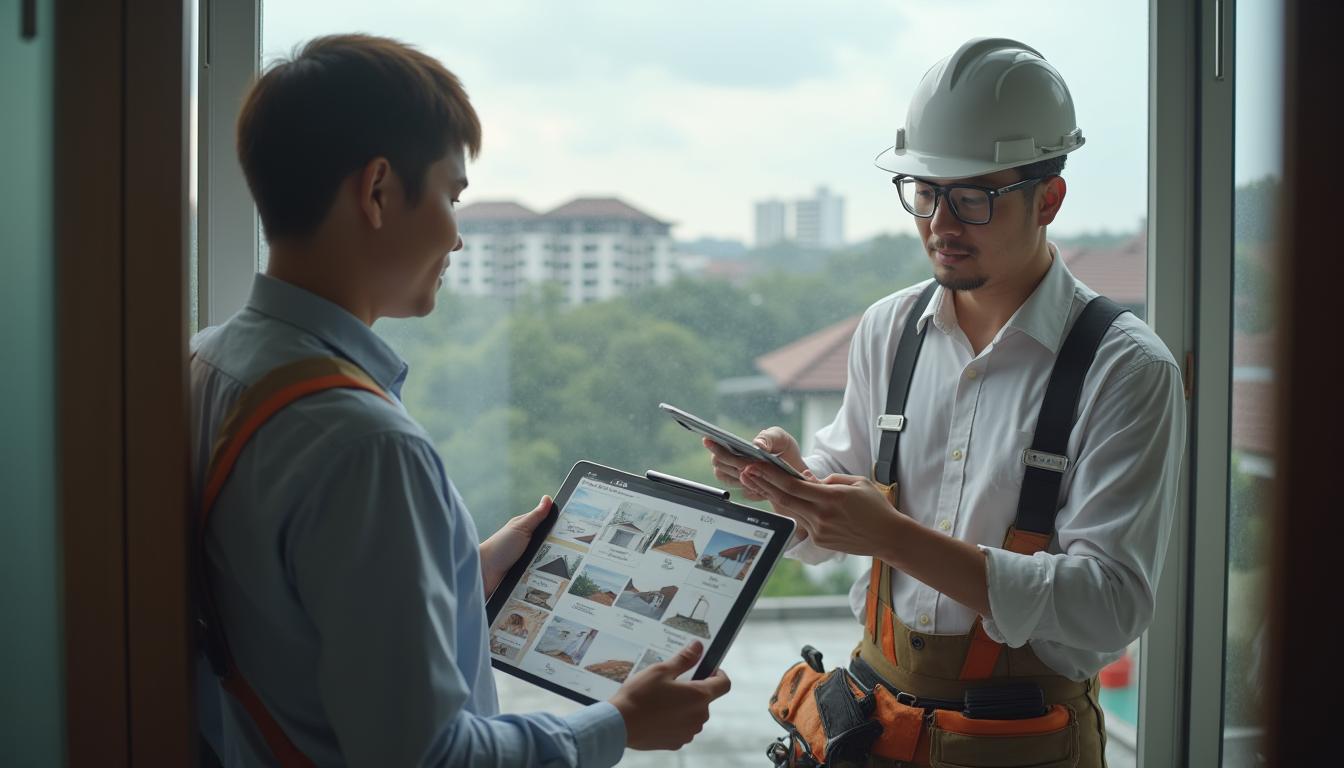
6. Value, Timing & Other Practical Questions
Does a new roof add value to your home?
Yes, a new roof boosts curb appeal, improves energy efficiency, and reassures buyers. In Singapore’s competitive property market, a well-maintained roof can be a key selling point.
How long does it normally take to replace a roof?
Most residential roofs take 2–5 days to replace, depending on size and weather.
- Tip: Schedule work during Singapore’s dry season (March–September) for fewer delays.
Which is more expensive, tile or metal roof?
Clay tiles are usually more expensive than metal roofing, but both are premium choices with long lifespans.
What is the most expensive metal roof?
Copper roofing is the priciest metal option, but it’s rare in Singapore due to the high cost and limited local suppliers.
What is the most expensive part of the roof?
Labor is the biggest expense, making up 60–70% of the total cost, especially for complex or high-pitched roofs.
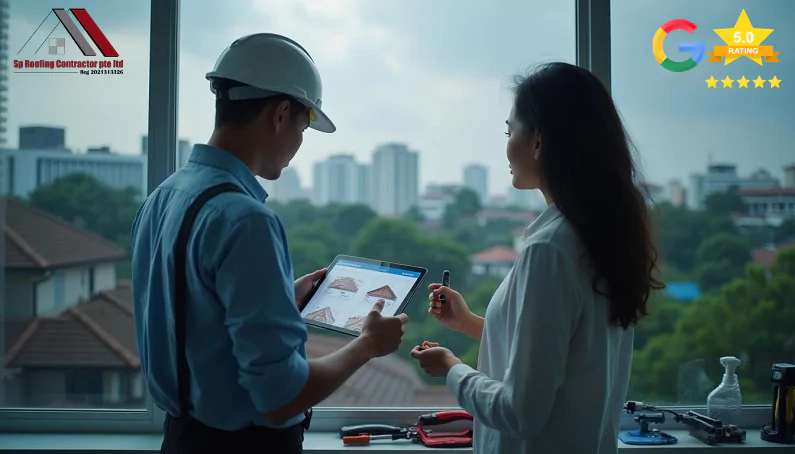
7. Additional Singapore-Specific Roofing Questions
How often should I schedule professional roof washing and cleaning in Singapore?
In Singapore’s humid climate, professional roof washing and facade cleaning should be done at least once a year, ideally before the monsoon season. This prevents algae, moss, and dirt buildup that can trap moisture and accelerate roof deterioration. Regular cleaning also helps maintain waterproofing effectiveness and extends roof lifespan.
- Pro Tip: Pressure washing combined with facade sealant work can protect your roof and walls from moisture ingress and UV damage.
What are the signs that my roof gutters and flashings need repair?
Look for water pooling near the foundation, overflowing gutters during rain, rust spots, or visible cracks and gaps in flashings. Blocked or damaged gutters can cause water to back up and damage your roof edges or walls. Flashing failures often cause leaks around chimneys, vents, or skylights.
- Local Insight: Singapore’s heavy rains can quickly worsen gutter issues, so timely repairs are critical to avoid costly water damage. Ream more to understand what are the signs- 10 Emergency Signs Your Roof Needs Repair in Singapore 2025.
Can awnings and canopies help reduce heat inside my home?
Yes, properly installed awnings and canopies provide shade that reduces direct sunlight on windows and walls, lowering indoor temperatures and cooling costs. Materials like UV-resistant fabrics or coated metal sheets are ideal for Singapore’s intense sun.
- Expert Tip: Choose designs that allow airflow to prevent heat buildup underneath.
How do I know if my roof needs complete restoration instead of just repairs?
If your roof shows widespread cracking, extensive moss or algae growth, multiple leaks, or the waterproofing layer has worn off, a complete roof restoration is advisable. Restoration involves cleaning, repairing damaged areas, applying new waterproof coatings, and sometimes replacing old tiles.
- SP Roofing Experience: Restoration can extend your roof’s life by 10–15 years and is more cost-effective than full replacement.
What is the difference between roof waterproofing and roof sealing?
Roof waterproofing is a comprehensive process that creates a barrier against water penetration using membranes or coatings. Roof sealing usually refers to applying a protective layer (like sealants or paints) that helps repel water but may not be as robust.
- Tip: In Singapore’s tropical climate, professional waterproofing is recommended for long-term protection, especially on flat roofs. Learn more from our comprehensive article – Top 5 Highly Durable Roof Waterproofing Methods 2025.
How quickly can roof leakage repairs be done in Singapore’s rainy season?
Emergency roof leak repairs can often be completed within 24–48 hours, depending on the severity. Quick action is essential to prevent water damage to interiors and structural components.
- Pro Tip: SP Roofing offers rapid response teams during monsoon months to handle urgent leaks.
Are there eco-friendly options for roof cleaning and waterproofing?
Yes, many modern cleaning agents are biodegradable and safe for plants and pets. For waterproofing, water-based elastomeric coatings with low VOCs (volatile organic compounds) are increasingly popular in Singapore for their environmental benefits and durability.
- Insight: Eco-friendly options often qualify for government green building incentives.
What are the common causes of roof leaks in Singapore’s climate?
Frequent heavy rains, high humidity, UV degradation, clogged gutters, damaged flashings, and poor maintenance are top causes. Tropical storms can also dislodge tiles or damage membranes.
- Expert Advice: Regular inspections and maintenance before monsoon season greatly reduce leak risks.
How long does a typical roof replacement take for a landed property in Singapore?
For a standard landed house, roof replacement usually takes 3 to 5 days, weather permitting. Complex roof shapes or multiple storeys may extend the timeline.
- Tip: Scheduling during the dry season (March to September) minimizes weather delays.
What maintenance should I do for my roof gutters in Singapore?
Clear leaves and debris every 3–6 months, especially before monsoon. Check for leaks, rust, and ensure downpipes are unobstructed.
- Pro Tip: Installing gutter guards can reduce clogging and maintenance frequency.
How do I prevent moss and algae growth on my roof?
Regular cleaning and applying anti-fungal or anti-algae coatings during waterproofing help prevent growth. Ensure good roof ventilation to reduce moisture buildup.
- SP Roofing Tip: Pressure washing combined with chemical treatments is effective for existing growth. You can also give a birds eye view on “How Roof Waterproofing Prevents Mould and Mildew in Your Home“.
Is re-roofing a good option for older homes in Singapore?
Yes, re-roofing (installing a new roof over the old one) can be cost-effective if the existing structure is sound. It saves demolition costs and reduces downtime. However, the old roof must be inspected for rot or damage before proceeding.
- Expert Note: SP Roofing assesses each case carefully to recommend the safest option.
What materials are best for awnings and canopies in Singapore?
Aluminum and powder-coated steel frames with UV-resistant fabric or polycarbonate sheets are popular for durability and weather resistance.
- Tip: Choose materials that resist corrosion and allow rainwater to drain easily.
How often should I schedule complete roof restoration?
Typically every 10–15 years, depending on roof condition and material. Restoration before major damage develops saves money and prolongs roof life.
- Local Insight: Singapore’s humidity accelerates wear, so more frequent inspections are recommended.
Can roof waterproofing help reduce energy bills?
Yes, reflective waterproof coatings and cool roof membranes reduce heat absorption, lowering indoor temperatures and air conditioning costs.
- Stat: Studies show cool roofs can reduce energy consumption by up to 15% in tropical climates.
How do I know if my roof flashing is failing?
Signs include water stains near chimneys or vents, rust, cracked or loose flashing, and drafts. Flashing failures are common leak sources in Singapore’s wet climate.
- Pro Tip: Regular inspection and timely repairs prevent costly water damage.
What should I expect during a roof cleaning service?
A professional roof cleaning includes debris removal, pressure washing, algae/moss treatment, gutter clearing, and inspection for damage. Some providers also offer facade sealant application to protect walls.
Singapore Roofing Market Insights 2025
- The Singapore roofing market is projected to grow steadily at 4.1% in 2025, driven by ongoing infrastructure projects and demand for sustainable, weather-resistant materials
- Government initiatives are pushing for more energy-efficient and green building solutions, so expect to see more solar and cool-roof technologies on the market.
- Supply chain disruptions post-pandemic have increased material costs by up to 15% since 2023, so early planning and budgeting are key.
Need a tailored quote or more expert advice? Contact SP Roofing Contractor, Singapore’s trusted roofing partner since 2007. For more information, check our roofing contractor services.

0 Comments